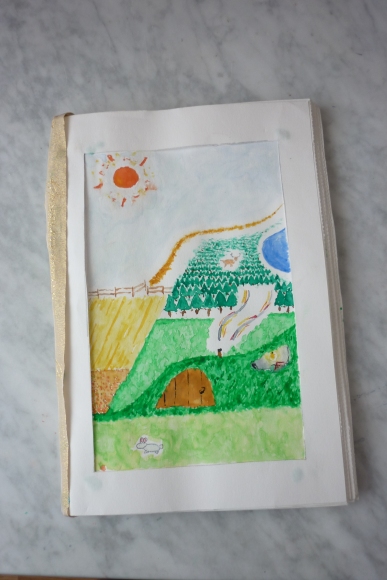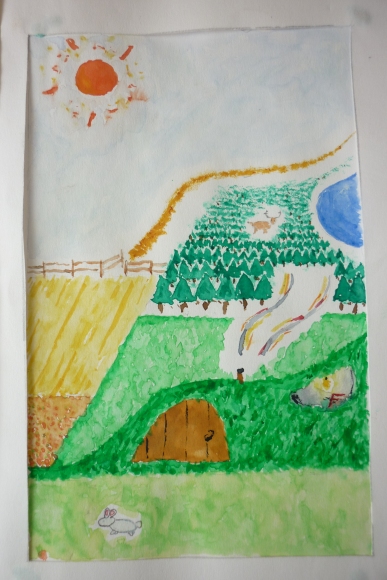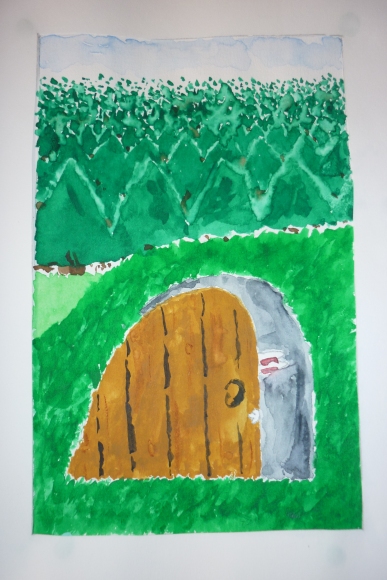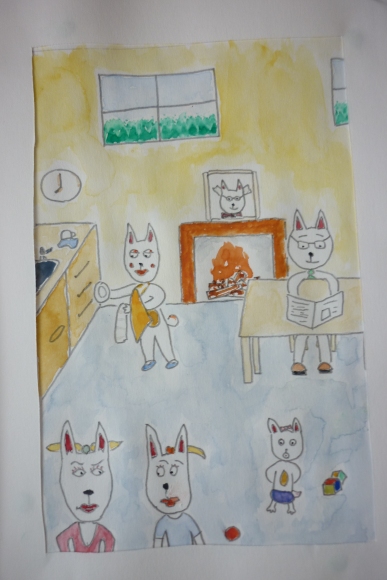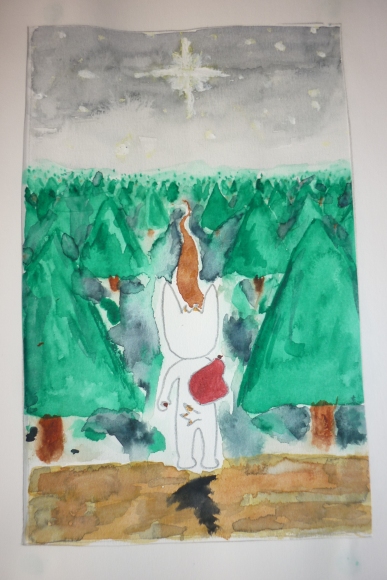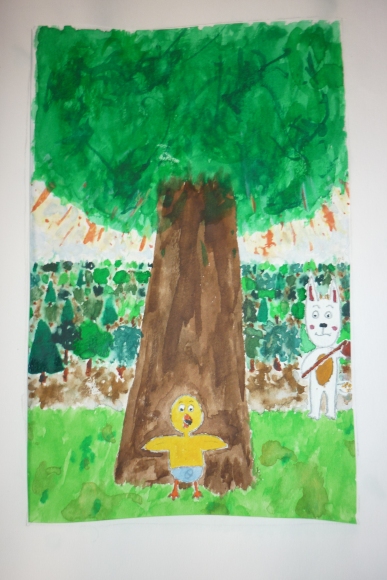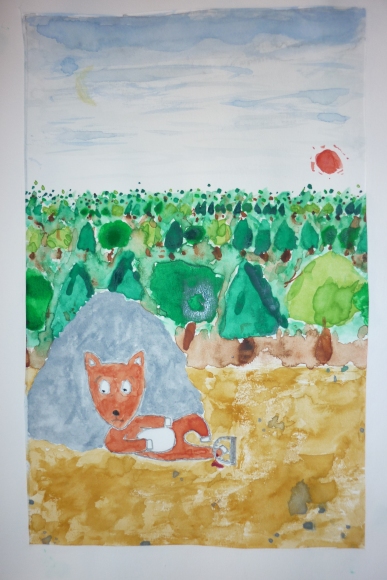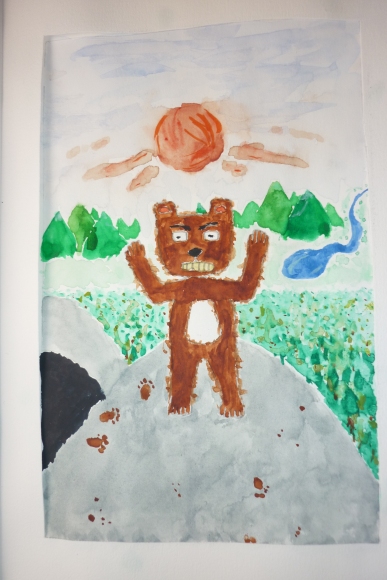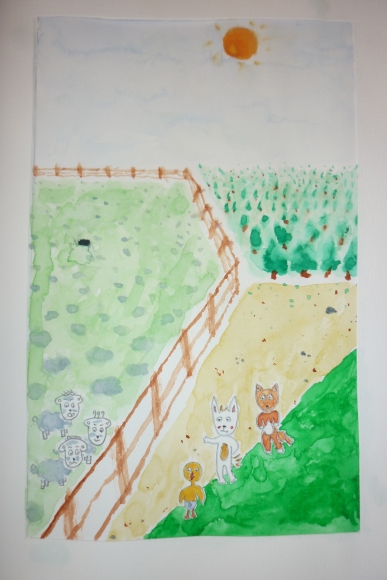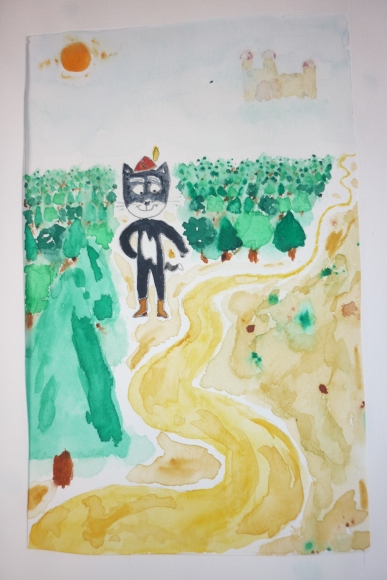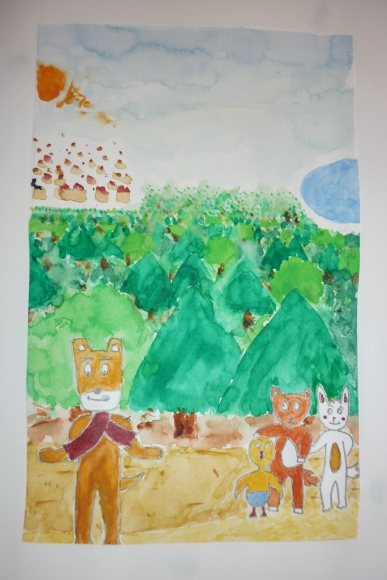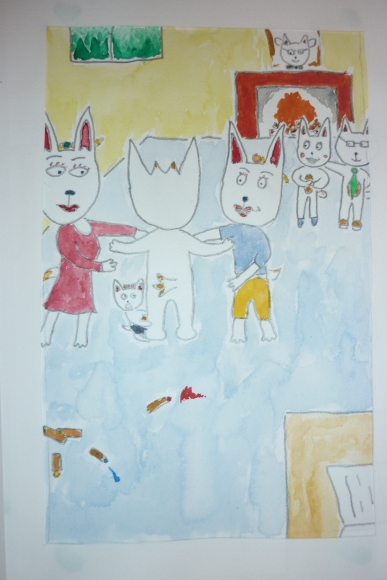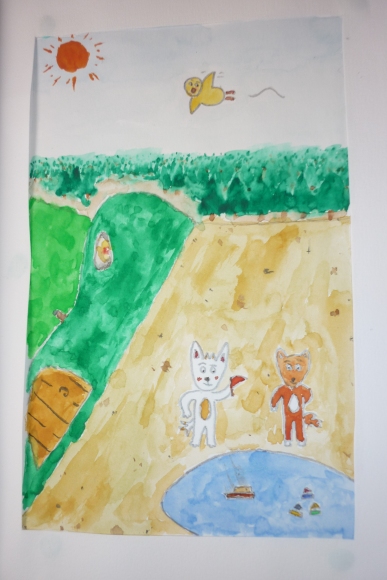
Daily Bread
It was already now several weeks after Easter. The Ascension had taken place, feast days had come and gone, and the time for fasting was so much a thing of the past that Thomas had well settled back into his regular mealtime habit. In the developing day the relevant hour had arrived; and time for Thomas had fallen precisely on those moments which he usually reserved for lunch – typically enjoyed between a little after twelve, and around half-past-one – this latter time, in accord with his generous nature, being only the limit by which lunch was to be served, not a deadline at which the meal was to be removed and discarded. Thomas liked to savour his meals, to revel in them, so that even lunch could last well past a single hour. Still, no matter how long he took, it could well be considered that Thomas had lunch rather early, taking into account the fact – surely risible to the working men – that only several hours earlier, at ten, would Thomas rise to greet a veritable feast of a breakfast.
Yes, this man ate well – he liked his food. And then with lunch eaten Thomas sat quite satisfied, his arms all but fastened around his sizeable belly; his fingers entwined as if trying to catch his stomach and pull it back in. Thomas was not a religious man – but let’s say he was: well then, even if he had fasted the whole of Lent, fasted like a Saint, like a Catherine of Siena, for an example, Thomas ate so profusely that he would already have grown back that gut which served to separate him from the average fellow. Simply put, he didn’t half like his food! He was fully cognisant of the fact, and remained through it all verily content.
As Thomas maintained his stomach, and leant back in his chair – a big thing with plush green cushions, two sturdy walnut arms, and a blue florid pattern on the back and seat; which remained permanently in the kitchen in spite of the contradiction of its heft with the kitchen’s compact size, and was pulled in and out from under the small oak table – he also tapped his feet, each in turn, upon the kitchen floor. And since all things in this world are interconnected; considering that man is positioned as steward of nature and, despite nature’s overwhelming power, can still affect things in his own determined way; this tapping on the floor had one particular repercussion. Underneath Thomas’s house, the plodding of his feet caused the soil there to alter, to break apart and fertilise, and from the resulting void there appeared a man – not a dwarf, nor was it an elf, nor did he wear a red cap and wink out at you like a gnome: this was a fully formed human being. He emerged from the earth in a seated position, saw his new surroundings with sharp darting eyes, then scurried out and into the open using his fingers to wade and scrabble through the earth.
Thomas of course knew none of this; could, of course, have barely even imagined; and happened to be just in the process of shutting his eyelids. His stamping had subsided, and his feet had planted apart; his two heels rose and fell as one, his calves tensed then relaxed; as he pushed himself blissfully, rocking in sequence, backwards and then forth. Oh, but if Thomas had known, if there had been any sort of clue, then he wouldn’t have rested his eyes, and he may even have withheld his meal that day, saving it for later. Certainly, and in retrospect it goes without saying, he would never have gone and done this: gone to open the door when, moments later, his eyebrows lifted upon hearing a knock.
Yet Thomas did not know. And so – raising both brows and then lids, placing hands upon knees and staring quite plainly before him for a few seconds – he lifted himself up with a sigh, padded out of his kitchen, along the corridor, and to the front door. Unhesitant he opened it, and there presented before him was a man – no doubt a man, but since coming from the dank earth under the house into the full breadth of the daylight sun, inversely he seemed to have grown a little smaller, narrower, and somewhat haggard. But then perhaps he was neither small nor haggard; perhaps he was precisely as when we first met him, and simply appeared enfeebled in the presence of Thomas’s size and girth. Or then again, maybe he looked haggard all right, but this was just a put on, played as a game, a demonstration, done for a show.
For he was all bent over, his hands squashing together in front of him and his head bowed, and Thomas could not make out whether he was muttering things, or whether he was not. Thomas tried working it out, greeted him warmly, ‘Oh, well hello there!’, ‘Then how are you today?’, ‘What’s up with you, my old mate?’, but received no response. Instead, as if by way of gesture, the man slowly raised his head to reveal pupils the likes of which I don’t know what; had Thomas questioning to himself where the irises had got to or what subtle colour they were; and then he strained his gums to draw his mouth out and into an O shape, before clasping it at once shut as if attempting to catch something inside. This was not a pleasant sight, and for Thomas, face to face with it all, it took on connotations which were quite horrific. He looked askance at that which was in front of him, frowned, took an expression which combined grief and pity, then turned in horror as it scampered past him, through his legs and into his home.
Once in his home, the fellow made straight for the kitchen, where he proceeded to cause a furore. He ran about Thomas’s table; with hands that seemed to grow by the second, first in the palms, then twice as much in each of the fingers, he groped and slapped at the kitchen tops; he ran pell-mell into Thomas’s chair, not quite sending it over, but shoving it right out of place, all skew, pointing in an unspecified direction. Even when Thomas had entered the room, come in and positioned himself at the foot of the table, this creature did not stop at its head, did not acknowledge Thomas or glance broadly his way. He simply continued to scamper, seemed to be doing some sort of dance, performing a ritual or casting a type of spell, and Thomas stared on for an instant, then shook and went after him, in the end having come to the conclusion that he wanted it out was all – he just wanted it out.
But whatever it was, it was hard to catch. Thomas tried, but would continually close in on his enemy only to feel his forearms crash against each other, having failed to clasp or smother that which they sought – that which they sought having an apparent knack for avoiding his clutches, managing to as if disappear, as it were, at just those precise points. Several times, Thomas even overextended himself to such a degree that he would tumble to the floor face first, hitting his chin or his nose, which was opposed to his everyday good nature. On other occasions in his life, under different circumstances, Thomas may well have stayed down after such falls – despite his broad stature and otherwise manly attributes, he was wont, at such times, to play something of the ridiculous man – often, falling upon his face, he would not get up for a long time, but would cover his head, roll round, whimper and rub his ailments whilst saying, ‘ah-owwwh’, in some reaction which he intuited would make people sympathise with him rather than laugh, or would at least stop them from actively poking fun. However, the laughter would come twice as loud in private, behind his back, and some people would even roll their eyes at him, tut under their breaths, and say that it shouldn’t be done.
The time came for departure and, with Thomas once more on the floor, the creature – his work apparently done – crawled over Thomas’s back, down the corridor, and out again into the open; where, after a few hurried steps, he soon calmed down and was soon barely even jogging, ambling as he moved through adjacent fields and away. Yet to Thomas, who was now standing erect in the doorway, straining to watch his visitor off into the distance, it seemed as if the man was more crazed with each step – he perceived him still running frantically, waving his arms with their huge hands above him in the air, kicking out his legs, galloping off, a maniac ever-increasing in strength. Possibly the heat of the sun distorted Thomas’s vision, and in the refracted light the man appeared more alive than he was; potentially this funny fellow – who was, after all, quite awkwardly built; who had, as we have seen, rather ungainly and surprisingly mobile joints and limbs – was suffering at that moment from spasms of the musculature, with his shoulders also popping in and out of place. Whatever was the case, we shall never know – perhaps the former is more likely, for there came a point when, having traversed several fields, the man all but disappeared, as if swallowed whole by the sun. Certainly across all his remaining days, Thomas was not to see the creature again: though occasionally finding himself outside, and with nothing in the vicinity, yet perceiving a steady distension in space, still no such encounter was once more to be felt.
At this time, however, Thomas could not have cared less, would not have wanted a repeat of any such incident; and was in fact neither contemplating nor caring about much of anything at all. He moved in a daze, back into his house, absent-mindedly leaving open the front door so that sunlight filled the structure, glistening across his floorboards, accompanied by an occasional rustling gust of wind. Moving back down the corridor, Thomas wavered, felt out with his hands so as to maintain his balance, so as not to fall; but it was no use; everything seemed changed; the walls of his house were not the walls of his home any more; and the support they could offer was not enough.
He flickered between two feelings and modes; the predominant finding him empty-headed and confused, looking about readily but blankly, lacking conviction and heart; which sensation only infrequently departed, to be replaced by its near opposite, a heavy-settedness which suggested, in its immobility, something desperate, and placed a tint of sorrow into his eyes. Thomas came to prefer this latter sensation, found it easier to bear, and it would gradually usurp the former in the regularity of its occurrence. Gladly, through force of habit, Thomas still found his way back into the kitchen and, finding his old chair in its usual resting place, was able to tumble into it at once.
Sleep is often said to be a great healer. In the midsts of a bout of deep melancholy, as one sits staring and pining into the night, one is often told reassuringly that they will feel better, after a good night’s sleep. Indeed, in the opinion of man, it seems only time is better prescribed for the curing of anguish. And, it is true, as Thomas drifted, in his chair, off to sleep, he felt washed over by a vague sense of ease; which perhaps came only with the knowledge that through sleep time also would be lost, the possible sufferings of the next few hours happily escaped and forgotten. For though Thomas slumbered a long time, right through to the following day – a day in appearance much like the one before – upon waking all sense of ease was lost, or was rather nowhere to be found – he experienced an immediate emptiness and disorientation as though struck on the head with a mallet in the seconds before rising, as if someone had been awaiting him, and this had been planned all night long.
Unable to remain seated in such a state, Thomas stood in the same second and began to pace the room. And it was only then, after circling the space three times, tapping at the wood on top of his chair and gazing out the window intently for a few long moments, that Thomas realised, in some distress, that he had not eaten now for some time. Indeed, since yesterday’s lunch, lost in the ensuing events, both dinner and supper had passed; and also, really, looking at the clock and determining things practically, now had this morning’s breakfast. But the devil with breakfast, Thomas thought. He was in such a way so that even his beloved, his food, could not exert an absolute control over him. Besides which, he had been especially looking forward to yesterday’s dinner, for which he had bought, seasoned and otherwise prepared a delicious – his favourite – cut of veal. Now it was not yesterday any more, but today in its place; dinnertime with veal could not commence; things could not be made good; and it seemed to Thomas as though everything concerning him was coming to an end.
How terrible for such to be the case! Thomas felt without a hope; but groping for some right path – and overcoming the progression of yesterday, the loss of three meals, and an utter lack of the veal he had so craved – still inclined towards sustaining his stomach with just a little bit of food, if insufficient to satisfy it completely. He made haste for what is the staple of all diets – for the bread basket, one which Thomas had even spent a sizeable sum of money on – it was a large, shining silver tin, a quarter circle the outline of its shape, with two flat sides, and the curved end acting as a sort of flap – utilising the wooden handle protruding from its front, you were to pull the flap up to reveal the bread. This tin almost filled at least half of the space on Thomas’s kitchen top – it had cakes in it and buns too – but at the centre lay a lovely crusty wholemeal loaf, and it was this loaf which Thomas now sought.
Quick of mind but casual of gesture, for Thomas was feeling lethargic; and more was perhaps even underestimating this loaf, treating it as a make-do, no substitute for a lost veal (he even muttered once under his breath about how bread was really a good accompaniment for meat, went well on the side and served to fill one up, but was not at all a meal in itself); Thomas at last reached the tin. He was about to raise its flap – he rose one arm intent upon doing so – but saw there was no plate – he had to get a plate out first, something to lay the bread upon. So he reached down into the cupboard below, took hold of a plate, and placed it in the middle of his kitchen table.
He went once more to the bread basket – this time was decisive, there was no holding back. However, though Thomas’s hand gripped the wooden handle well and true, whilst he still possessed the strength to tug and pull at it, it would not give, and the flap remained stoutly shut. At first, Thomas could make no sense of it; did not know just how it could have become jammed in such a way; and tore at the handle with all his strength. He then felt he was perhaps not using the whole of his strength; that he had strength in reserve, but could not use it because he was not concentrating hard enough, could not concentrate; and in any case, his hands kept slipping from the handle. So he towelled his hands dry, floured them hoping to soak up thereby any remnant moisture, and went at it again, but the bread basket would not budge. In the midst of his endeavour, before Thomas had quite given up, an inner flash came to him and told him what was what – that yesterday’s creature must have been up this, this must have been his aim; and how was Thomas, an ordinary man, to fight against a power such as this? He backed away from the bread tin, struggled for breath, and began to motion about the room repeating, ‘My daily bread! My daily bread!’, continuing as if in a trance for a time to come.
Hours passed. Thomas’s hunger grew, but he did not feel it any more: the problem was not his hunger, but the very lack of bread. It is interesting to consider that, in all the time which had been, and in all that which was to follow, Thomas never hit upon, for instance, wandering to the store for some other food; perhaps stopping off at a nice little café on the way; or else simply rolling the flour which still covered his hands into a dough, in order to make something for himself. He thought not of veal any more either, but was concerned only with that which lay stranded in his large, silver bread tin with wooden handle – namely, one crusty wholemeal loaf. And so, something had to be done to retrieve it.
An unforeseen period of time stretched over – Thomas could not bring himself to do that which, however, seemed like the only way forward – to lift up the silver tin, and throw it to the ground, hoping it would break apart and replenish him. It was not at all the tin itself he was worried about – oh no! – such thoughts were well past him – but he worried solely and intently on his wholemeal loaf inside. He knew the loaf was old now, that it must be hard and covered with mould – and yet let it be hard – he could not face the possibility of breaking it! But what else? So Thomas pushed off against his knees and stood up; he took the silver tin in his hands, he cradled it for a few moments, before finally raising it above his head where, weeping, hunched over to the ground, it was at last dropped.
____________
About the story: This is pretty much the first short story I ever wrote and completed, around seven years ago, when I was nineteen or twenty. I recalled it recently and read through it for the first time in a few years, and I thought it was worth publishing here, particularly fitting since we have just had Easter weekend.
The story can be viewed and downloaded as a PDF file, with a frontispiece, here: ‘Daily Bread’











